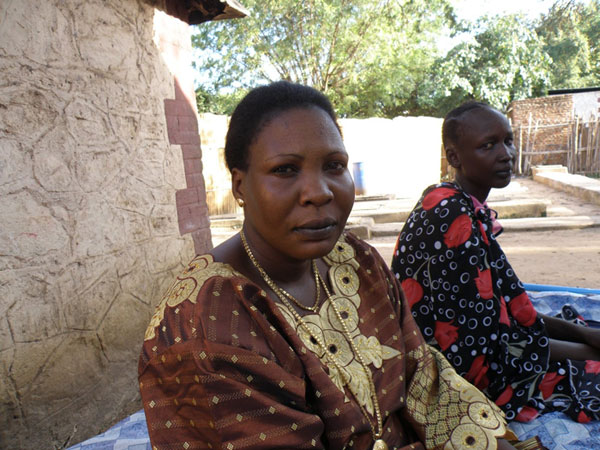My name is Rebecca Mun Deng. I was displaced in 2001. We were living in a small village called Ngop. Now I live in Bentiu. I have a business buying second hand clothes in Juba and then taking them to Bentiu where I sell them. I buy something for maybe 5 pounds and then I sell it for 10 pounds. My education was in Nuer language only. I reached something like primary three school level.

Voices of the victims – Interview
We lost everything in the displacement. We had four luaks and eight tukhuls. We had around four feddans of land. On it we grew many things like maize, sorghum, pumpkins, beans, groundnuts and so on. Everything was burnt to the ground.
We also had two hundred cows. From this fifty were bulls and a hundred and fifty were cows. All of them were taken. Of course we had milk. But we did not sell it because Mayom village was too far. But sometimes we would take some crops to the market to trade for other things. I don’t know the value of these.
The attack was from Arab cattle keepers that had been generated by the Government of Sudan. The government gave them guns and bullets. They did not wear a uniform. They came at night, on foot. In one night fifteen members of my family were injured and six were killed.
Two of the ones that were killed were my sister’s sons. My husband lost two brothers. A son of my auntie was killed and a son of my uncle.
They were all shot.
I only heard about four of the deaths afterwards, I did not see them. But I saw what happened to my sister’s sons. One was shot in the legs and there was just too much blood so he died. The other one was shot in the back. I remember the flashes of the guns in the night. We just ran in the opposite direction. My older son carried his younger brother. We ran at night and then we walked for two days on foot. We lost everything from clothes, to our mosquito nets and all our sorghum.
When we got to Mayom there were two operations, the World Food Program and Agro Action. They gave us food, new mosquito nets. We also had some family who helped us.
According to our Nuer culture when you have loss of cattle you do not have to worry forever because you can get more cattle when you marry your daughters. Now again we have some. The number of our cattle is not like before but slowly they will increase. We have forgotten about the cattle we lost.
The problem for us, the loss, is the six people who were killed.
There are oil installations now where our village is. There was none in 2001 but now it is this Nile Petroleum company. Maybe we will go back. But I do not know if there is enough there to support us. We will see how the peace deal [Comprehensive Peace Agreement] goes.
It would be very good if we were given compensation. But we don’t know where we can go or who we can ask. We don’t know who has been compensated or where. I have the right, I believe.
Interview by Skye Wheeler, Sudan-based journalist
Juba, September 10, 2008



